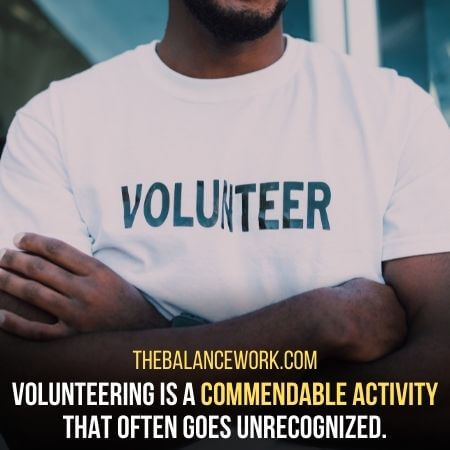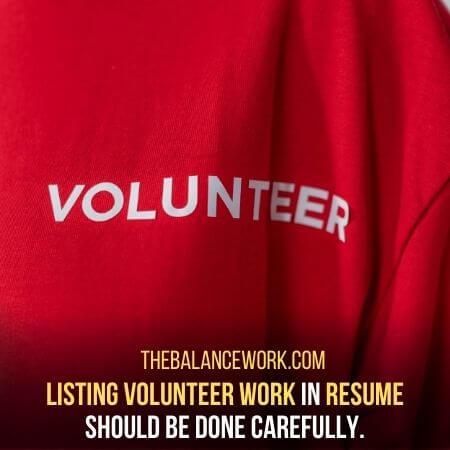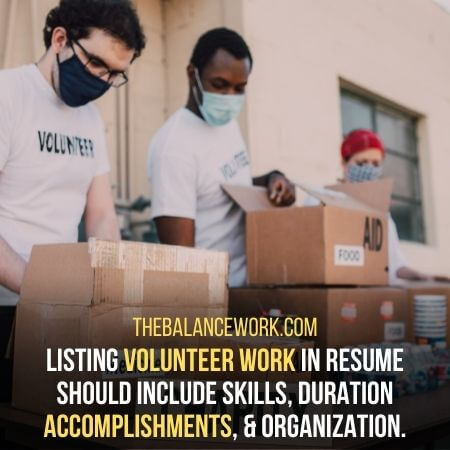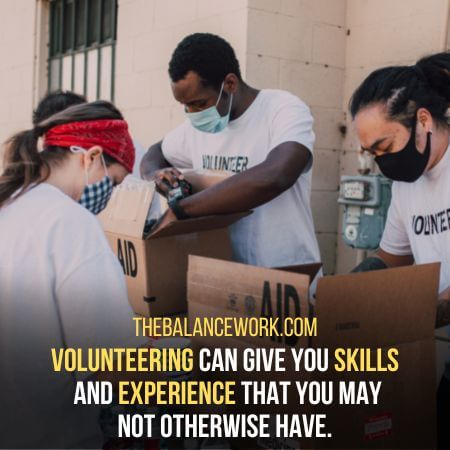Have you volunteered before and are skeptical about whether to add it to your resume or not? Many want to know: does volunteering count as work experience? Let’s give you the complete answer.
Volunteering is a commendable activity that often goes unrecognized. It’s also a great way to get work experience. So it’s essential to understand if volunteering can be counted as such.
Does Volunteering Count As Work Experience
The answer to this question depends on what you mean by “work experience.”
When Is The Answer “Yes”?
If you’re asking if volunteering can show that you have experience in a specific field, then the answer is yes.
For example:
You’re a recent graduate with no professional experience. You can list your volunteer work as an accomplishment on your resume.
This will show potential employers that you have experience working in a professional setting.
Some fresh graduates usually cry that even clerical jobs require experience. If you don’t have any, try volunteering with reputed organizations.
They can increase the chances that you will land a job as they are good to work experiences.
When Is The Answer “No”?
However, if you’re asking if volunteering can help you gain paid work experience, then the answer is no.
Volunteering is not a means to an end; it’s an end.

Employers are not likely to give you paid work because you’ve volunteered in the past.
The main reason why volunteering doesn’t come under work experience is that:
Employers are not likely to give you paid work because you’ve volunteered in the past.
They believe that you should be volunteering because you want to, not because you need to make money.
Volunteering Can Lead To Paid Work:
That being said, there are certain cases where volunteering can lead to paid work.
For example:
You’re a recent graduate who has volunteered with a particular organization. You may be able to get a job with that organization.
But in general, volunteering does not count as work experience to gain paid work.
Difference Between Volunteering And Work Experience:
The main difference between volunteering and work experience is that:
Work experience is usually in exchange for money.
Work experience is often acquired through internships, jobs, or apprenticeships.
Volunteering, on the other hand, is usually unpaid.
This difference is crucial because volunteering cannot be a substitute for work experience.
How To List Volunteer Work On Your Resume:
If you have volunteered in the past and would like to list it on your resume, there are a few things you need to keep in mind:
1. Don’t Lie:
The first thing you need to remember is that you should never lie on your resume.
If you list volunteer work that you haven’t done, it will come back to bite you later on.
Always mention the volunteering experience where you worked with passion and dedication.
Otherwise, it’s better not to list it at all.
2. Be Honest:
The second thing you need to remember is that you should be honest about your experience.
If you’ve only volunteered for a few hours, don’t list it as if you’ve been volunteering for years.
Employers can see through dishonesty, and they will not appreciate it.
Be honest about your experience, and list the correct dates.
3. Use The Right Format:
You should use the correct format when listing volunteer work on your resume.
There are two ways to do this:
1. You can list it under the “Work Experience” section of your resume.
If you list it under the “Work Experience” section, list it as “Volunteer Work.”

2. You can list it under the “Volunteering” section of your resume.
4. Mention Your Accomplishments:
It would help if you mentioned your accomplishments while volunteering.
This will show potential employers that you have experience in a particular field.
For example:
If you volunteered with an organization, you can list your accomplishments as such:
– Joined the organization and participated in their activities.
– Worked with other members of the team to achieve common goals.
– Learned new skills while working with the organization.
– Increased visibility of the organization in the community.
5. Use Relevant Keywords:
You should use relevant keywords when listing volunteer work on your resume.
This will help potential employers find your resume quickly.
For example:
If you volunteered with a particular organization, you can list the keywords:
– “Volunteering,”
– “Nonprofit,”
– “Charity,” and
– “Community.”
6. Mention The Length Of Time:
Moreover, it would help to mention the length of time you volunteered for.
This will give potential employers an idea about how much experience you have.
For example, you can list the following:
– 3 months
– 1 year
– 2 years
7. List The Skills You Gained:
Always remember to list the skills you gained while volunteering.
This will show potential employers that you have experience in a specific field.
For example:
If you volunteered with a specific organization, you can list the skills you gained as:
– Communication Skills
– Teamwork Skills
– Problem Solving Skills
– Leadership Skills
8. Mention The Type Of Work You Did:
Always mention the type of work you did while volunteering.

This will help potential employers understand what type of work you like.
For example, you can list the following:
– Customer Service
– Marketing
– Fundraising
– Event Planning
9. Mention The Name Of The Organization:
It would help if you mentioned the organization’s name you volunteered with.
This will show potential employers that you have experience in a specific field.
For example, you can list the following:
– Red Cross
– United Way
– Salvation Army
– Animal Rescue Group
10. Be Professional:
You should be professional when listing volunteer work on your resume.
Make sure to use proper grammar and spelling. And, list the correct contact information.
Also, never lie about your experience.
If you follow these tips, you will be able to list volunteer work on your resume like a pro!
Is Volunteering Experience A Good Addition To Your Resume?
Not that we have answered your question: does volunteering count as work experience? Let’s discuss advantages of volunteering work. Not under work experience, but volunteering can help you get a competitive advantage. Here’s how:
1. It Shows You Take Initiatives:
Volunteering shows that you have taken the initiative to do something different.
And this is a quality that employers value. Thus, it can be a great addition to your resume.
Employees prefer candidates who can take the initiative and are not afraid to take risks.
2. It Shows You Have Cultural Awareness:
Volunteering often exposes you to different cultures.
It also allows you to learn about various social issues. This cultural awareness can be an asset in the workplace.
Many employers look for employees who work well with people from different cultures.
3. It Shows You’re Committed:
Employers also like to see that you’re committed to something.
They want to know that you’re not just looking for a job but also looking for a career.

This commitment is the main element of volunteer work. Employers see this as an indication that you’re willing to go the extra mile for your job.
4. It Shows You Have Leadership Skills:
Volunteering also allows you to showcase your leadership skills.
Often, volunteers get tasks that they need to complete independently.
This enables you to develop leadership skills. It shows potential employers that you’re capable of taking charge.
5. It Shows You Have A Good Work Ethic:
Finally, volunteering shows that you have a good work ethic.
Employers often look for employees who have a good work ethic.
This is because they know that these employees will be committed to their work. Thus, they will be less likely to leave the company in the future.
6. It Shows Your Passion For A Cause:
Volunteering shows that you are passionate about a particular cause or issue.
And employers like to see this. A passionate candidate about one specific point is likely to be more engaged in their work.
Thus, it grabs your employer’s attention and creates a good impression.
7. It Can Help You Build Relationships:
Volunteering allows you to build relationships with people from different backgrounds.
It can help you network with people who may be able to help you in your career.
Employers want employees who have an excellent network. And, if they can provide greater value to the company.
8. It Gives You Special Skills And Experience:
Volunteering can give you skills and experience that you may not otherwise have.
For example, if you volunteer with an animal shelter, you may learn how to handle animals.
This can be helpful when applying for jobs that require special skills.
If you volunteer with a nonprofit organization, you learn how to fund raise. Or write grants.

This experience can be very beneficial when applying for jobs in the nonprofit sector.
9. It Shows You’re A Team Player:
Employers also look for employees who are team players.
This is because they know that these employees will be able to work well with other team members.
And volunteering allows you to develop teamwork skills. Thus, it can be a great addition to your resume.
10. Exceptional Cases:
Some companies prefer employees who have done community service before.
Community service and volunteering are often seen as the same. So, if you have done community service in the past, it can be an added advantage.
So, there you have it! Ten reasons why volunteering can help you get a job.
Keep in mind that not all volunteer experiences are equal. Try to find volunteer opportunities that will give you skills to use in your career.
Be sure to showcase these experiences on your resume and during job interviews.
Conclusion:
So, does volunteering count as work experience? The answer is yes and no – it depends on what you mean by “work experience.”
Volunteering can prove that you have experience in a specific field. But you can’t use it to gain paid work experience.
The bottom line is that volunteering can help you get a job. But it depends on the type of volunteering you do and the type of job you’re applying for.
So, if you’re not sure whether to include your volunteer work on your resume, it’s best to consult an expert.
When listing volunteer work on your resume, there are a few things you need to remember.
You should not list it as paid work. And, it would help if you were honest about your experience.
Last Updated on 2 years ago by Shahzaib Arshad
- Why Does My Boss Wink At Me? 6 Potential Reasons - October 5, 2023
- Is It Legal For Your Employer To Call Your Doctor? No, But… - October 4, 2023
- 12 Ways To Deal With A Low IQ Person - September 22, 2023